- What Interviewers Look For
- Steps to Answer the “Greatest Weakness” Question
- Identifying Your Personal & Professional Weaknesses
- What Are Your Weaknesses: Tips To Answer
- What Is Your Greatest Weakness Question: Sample Answer
- Common Weaknesses in Interviews
- Conclusion
- Frequently Asked Questions
What Is Your Greatest Weakness?: Learn How To Answer With Tops Tips & Samples
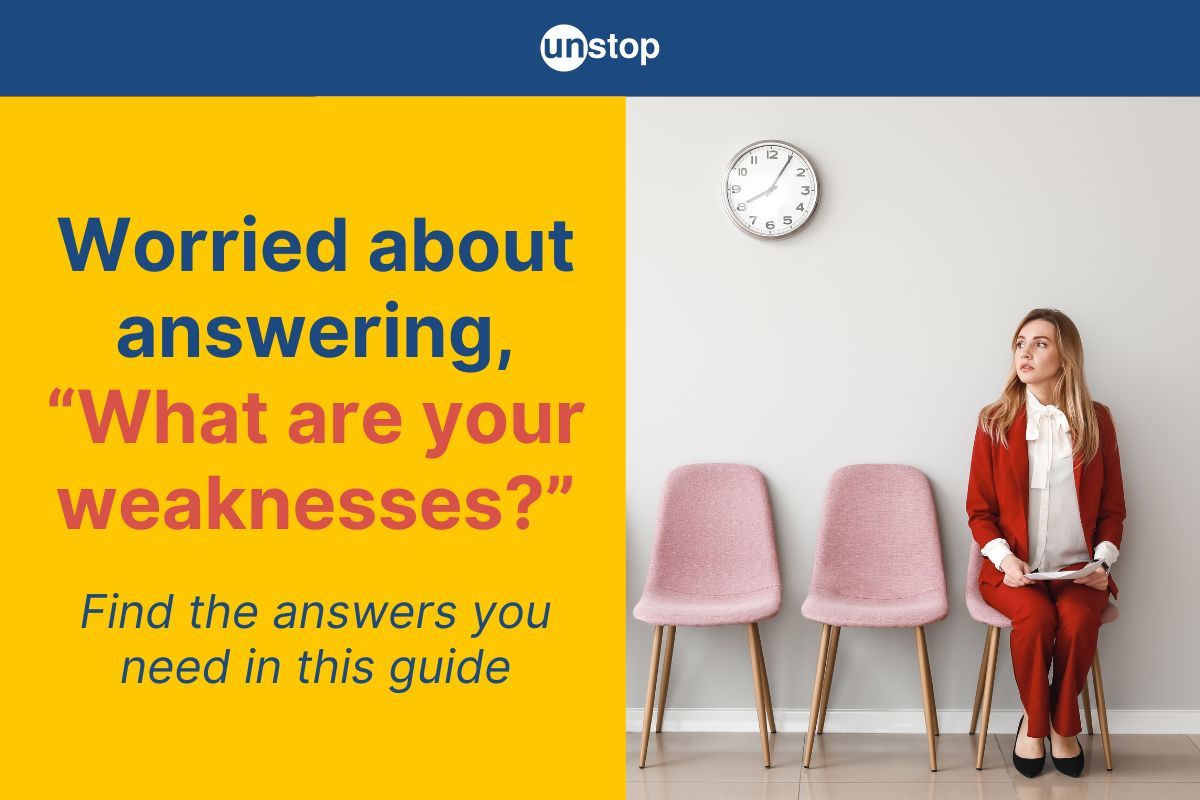
“To share your weakness is to make yourself vulnerable; to make yourself vulnerable is to show your strength”- JoyBell C.
What are your weaknesses? — a question we hardly pay attention to until it comes up in a job interview. But what makes this job interview question so different from the rest? It is not as if you have never heard it before. Then what makes answering 'What is your greatest weakness?' difficult during a job interview?
The answer is most probably one of these:
- You are unaware of your weaknesses.
- You are aware of your weakness but find it difficult to articulate.
- You are very uncomfortable when someone asks, 'What are your weaknesses?'
If you are stuck with any of the above options, we have some help for you. Here are some tips and 'What is your biggest weakness' answer samples to help you prepare this question for your next job interview! So let's get started.
What Interviewers Look For
Candidates are deterred by this question because they feel it is a trap—one wrong word, and they will lose out on a golden job opportunity.
But, with this question, the interviewer gauges your level of self-awareness. Interviewers want to know the person behind the perfect resume, judge your soft skills or people skills, and know the kind of person you are.
Your school, college, or office — all environments teach you various lessons. You are engaged in myriad activities at these places, experiencing success and failure. This develops your character and skills, and you learn about your strengths and weaknesses.
The interviewer really wants to know whether you have ever reflected on these outcomes. If the answer is yes, what sort of measures have you taken to perfect your strengths and curb your weaknesses? Weakness is special because it helps the interviewer understand your capacity to handle difficult situations and come up with an effective solution.
Also Read: Top 35 Interview Questions For Freshers With Answers

Steps to Answer the “Greatest Weakness” Question
To prepare for answering the question, "What is your greatest weakness," it is essential to approach it strategically. Here are some steps to help you craft a thoughtful and honest response:
- Reflect on your weaknesses: Take some time to self-reflect and identify areas where you may have room for improvement. Consider both technical skills and soft skills that you may struggle with.
- Choose a relevant weakness: Select a weakness that is genuine and relevant to the job you are applying for. Avoid mentioning weaknesses that are essential for the role, or that may raise red flags for the interviewer.
- Provide context: When discussing your weakness, provide context or examples to illustrate how it has impacted your work in the past. This can help demonstrate self-awareness and show that you are actively working on improving.
- Discuss your efforts to improve: Show that you are proactive in addressing your weaknesses by discussing steps you have taken to overcome them. This could include seeking training, mentorship, or taking on new challenges to grow in that area.
- Stay positive: While discussing your weakness, maintain a positive attitude and focus on how you have learned from it and grown as a result. Avoid dwelling on the negative aspects and instead highlight the lessons you have gained.
By following these steps and preparing in advance, you can confidently answer the question about your greatest weakness during an interview.
Identifying Your Personal & Professional Weaknesses
The first step in preparing to answer the question, “What are your weaknesses?” is to know them. What do you do if you are not aware of your weakness? What will you say to an interviewer if you don't know your real weakness yourself?
Identifying your personal and professional weaknesses for a job interview is crucial in showcasing self-awareness and a willingness to grow. To identify your weaknesses, it's important to take a proactive approach.
Self Reflection
Start by reflecting on past feedback you’ve received from supervisors, colleagues, or performance reviews. This feedback can provide valuable insights into areas where you may need improvement. For example, if multiple people have noted that you struggle with time management, this could be a clear indicator of a weakness to address.
Self-Assessment Exercises
Conducting self-assessment exercises is another effective method. These activities can help you pinpoint specific skills or behaviors that might be holding you back. You might ask yourself questions like, “What tasks do I avoid?” or “In what situations do I feel the least confident?” This kind of reflection encourages personal growth and helps you develop a clearer understanding of your capabilities.
Taking personality or skills assessments can further enhance your understanding of your weaknesses. Tools like the Myers-Briggs Type Indicator provide insights into your personality traits and how they influence your work style.
Input From Mentors
Seeking input from mentors or trusted individuals in your professional network can also be beneficial. They can offer an outside perspective on your strengths and weaknesses, helping you see blind spots that you might not notice yourself. Engaging in open conversations about your performance can lead to constructive criticism, which is essential for growth.
Find the perfect mentor on Unstop to improve your chances of cracking interviews, handling work challenges, and progressing in your career.
Pro Tip: For professional weaknesses, think about specific skills or knowledge gaps that may hinder your ability to excel in a particular role. This could be related to technical skills, communication abilities, or leadership qualities.
What Are Your Weaknesses: Tips To Answer
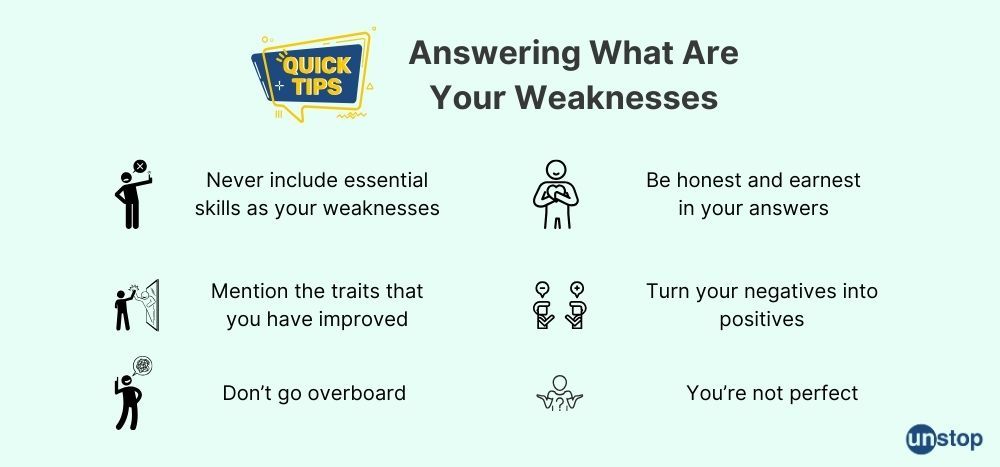
There are several ways to answer 'what is your greatest weakness?" in a job interview. Let's discuss some points to keep in mind, along with sample answers:
1. Never include essential skills as your weaknesses
The first way to discuss weaknesses is to first analyze the key skills that are required for the position you are interviewing for. The interview can be for B-School admission, job after B-School, apprenticeship, college committee, availing scholarship, etc.
You should categorize the skills that are most required in a job. Studying the job description is a great way to understand what skills are most essential for the role. You can then tailor your answer accordingly.
The way forward is clear. Never mention those skills mentioned in the job description or required for the position as your weaknesses during the interview.
Let's look at the following example and sample answer:
Example: Suppose you are applying to a top B-School. It's a high-pressure environment. Thus, time management, presentation skills, and punctuality are some of the top skills required in a B-School. After you have evaluated this, you can mention that your penmanship is not good. Although good penmanship is always a good skill to have, for B-School and the corporate world it is not a must-have. If you are appearing for a job interview after engineering graduation, alter your answer accordingly.
2. Mention the traits that you have improved
The second way to discuss weaknesses is to mention the skills that you are not so good at but have improved over the years. It's better to focus on soft skills than technical skills, in this case. Again, it is critical that you do not mention the key skills required for the position you are interviewing for. Try to find out some auxiliary skills that are required and mention those skills.
Pro Tip: Start by telling how you discovered your weakness, its impact (the difficulties you faced due to this) and what measures you have taken to rectify it. You can share anecdotes from your personal life or work to answer authentically.
Let's look at the following example and sample answer:
Example: My communication skills can definitely do with improvement. Once I was asked to deliver a speech during my schooling days. I'd practiced it many times at home but on D-day when I was delivering the speech, I forgot a line of the speech and became blank. Though I'm not a shy person, the whole lot of staring faces left me scared. From then onwards, I was always reluctant to come on stage. I always envied those who could speak better than me. So, when I came to college, I decided to join the public speaking club. I participated in extempore debates to test my skills. Over the years, I have brought a lot of improvement in myself. I have reduced my stage speaking reluctance. Still, to curb the fear in its entirety, I have joined the Toastmasters Club and am trying to perfect my communication skills.
3. Turn negatives into positives
The third way to answer 'what are your weaknesses?' is to turn negatives into positives. Here, some of your critical personal traits can be used to describe weakness. For example, traits like micromanagement, attention to detail, adherence to deadlines, etc. can be used to describe a weakness which is, in turn, a positive.
Let's look at the following example and sample answer:
Example: I pay close attention even to the smallest details. This has led me to triple-check every item on a spreadsheet, proofread emails to ensure I had communicated what I was trying to say in a clear, succinct manner, or mess with the structure of a presentation to guarantee it was perfect in the past. I have since learned to efficiently budget my time and gauge which jobs demand and really benefit from this level of precision.
As is clear in the above example, attention to detail is not a real weakness but it can be a cause of concern when it takes up more time. This is why, the sample answer also includes a supporting statement on how to counter its negative aspect.
4. Be Honest and Earnest
Your answer should be both honest and earnest. It should not seem as if you are framing your answer out of air. It should be backed by your previous experiences and real-life examples. The efforts that you made to rectify your weakness should sincerely signify your earnestness. If this is not the case, the answer may backfire. So, be cautious while framing your answers.
5. Don't Go Overboard
You should not talk too much about your weakness i.e., you should know what's the hard stop in your answer. If the interviewer or the hiring manager perceives you as a person who is too infatuated with your weakness, then the interviewer may deem you unworthy of the position.
6. You are not Perfect
Never say you have no weaknesses. Claiming to be perfect can raise red flags for interviewers, as it suggests a lack of self-awareness or an inability to grow. Everyone has areas where they can improve, and acknowledging these weaknesses shows maturity and a willingness to develop.
For instance, you might struggle with time management or find it challenging to speak in public. By openly discussing these weaknesses, you demonstrate honesty and the ability to reflect on your own skills. You can also mention how you are actively working on these areas, such as taking a course on public speaking or using productivity tools to manage your time better.
This approach not only presents you as a more relatable candidate but also highlights your commitment to personal and professional growth, which many employers value highly.
What Is Your Greatest Weakness Question: Sample Answer
Here's a sample answer to the question, 'What is your greatest weakness?':
Sample Answer:
I have, in the past, struggled to maintain a balance between my work and life. For example, In my last organization, I was new to project management and struggled to achieve a work-life balance, and this impacted my stress levels. As a team leader, this was also setting the wrong example for my team. My senior project manager observed this and provided me with constructive feedback on why maintaining the balance was important and what I could do to achieve it. I took his feedback and created a comprehensive schedule - dividing tasks by priority, complexity and time. This allowed me to take a step back and assign things with greater accuracy and efficiency. It also allowed me to delegate with precision and even improved the quality of my feedback delivery to the team. Now, whenever I am new to something, I first analyze the task and divide it into smaller, achievable targets so as not to get overwhelmed.
Now let's see why this answer works:
- For starters, the sample answer includes a real-life example. It mentions a real weakness but also discusses how the speaker overcame the weakness, which shows professional development.
- Secondly, the answer shows honesty and earnestness. It also includes skills that are transferable—thus, important for any role.
- Lastly, the answer is precise. It doesn't shift blame, but it does not expand on the pitfalls of not having a work-life balance.
It includes the aforementioned important tips required when framing an answer to the question, 'What is your weakness?' At the same time, it avoids the major mistakes—going overboard and being dishonest.
Common Weaknesses in Interviews
When discussing weaknesses in a job interview, it's essential to be honest yet strategic, showing self-awareness and a commitment to improvement. Here are some common but thoughtful weaknesses you can mention that go beyond clichés:
Delegating Too Much Responsibility
"In previous roles, I tended to take on too much myself, thinking I could handle it more efficiently. I’ve learned the importance of delegating tasks to leverage the team's strengths, and I’m working on improving this."
Overthinking Decisions
"I tend to overanalyze situations and decisions, which can slow me down at times. I've been working on trusting my instincts more and moving forward with the information I have."
Need for More Public Speaking Experience
"While I can effectively communicate in small groups, I’m still gaining confidence in larger public speaking scenarios. I've taken steps to improve this by attending workshops and seeking more opportunities to present."
Being Too Detail-Oriented
"I can get caught up in the details of a project, sometimes losing sight of the bigger picture. I’m learning to balance my focus on precision with the need for timely completion."
Reluctance to Ask for Help
"In the past, I’ve been hesitant to ask for help, thinking it might reflect poorly on my abilities. Now, I’ve realized the value of seeking input and collaboration early on to produce stronger results."
These weaknesses show both self-awareness and a proactive approach to addressing areas for improvement without falling into the trap of overly generic statements like "I'm a perfectionist."
Avoiding Clichés in Responses
When asked about their greatest weakness in a job interview, interviewees can avoid clichés by being authentic and specific in their responses. Instead of using overused phrases like "I'm a perfectionist" or "I work too hard," candidates should reflect on a genuine area of improvement and provide examples of how they are actively working to address it.
By demonstrating self-awareness and a willingness to grow, interviewees can stand out from the crowd and show that they are committed to personal and professional development. It's important to be honest and transparent while also highlighting the steps taken to overcome weaknesses rather than relying on generic responses that lack depth and sincerity.
Conclusion
Remember, there is no absolute answer to the question, “What is your biggest weakness?” in a job interview. You need to analyze this question and come up with your best reply. So calm your mind and relax your thoughts, and you will definitely come up with the most innovative answer.
Best of luck!
Frequently Asked Questions
1. What are some common weaknesses to avoid mentioning in a job interview?
In a job interview, it is best to avoid mentioning weaknesses that are essential for the role you are applying for. For example, if you are applying for a customer service position, saying that you struggle with communication skills would not be ideal. Instead, focus on weaknesses not critical for the job, such as being overly detail-oriented or having difficulty delegating tasks.
2. How can I turn my weaknesses into strengths during a job interview?
One way to turn your weaknesses into strengths during a job interview is to show how you are actively working to improve them. For example, if you struggle with public speaking, you can mention that you have taken public speaking classes to enhance your skills. This demonstrates your willingness to learn and grow, which can be seen as a positive attribute by potential employers.
3. Is it okay to mention personal weaknesses in a job interview?
While being honest in a job interview is important, it is generally best to focus on professional weaknesses rather than personal ones. Personal weaknesses may not be relevant to the job you are applying for and could potentially raise red flags for employers. Stick to work-related weaknesses and show how you are actively addressing them.
4. How many weaknesses should I mention in a job interview?
It is recommended to mention only one or two weaknesses in a job interview. Focusing on too many weaknesses can give the impression that you are not qualified for the role. Choose minor and easily improvable weaknesses, and be prepared to discuss how you are working to overcome them.
5. How can I prepare to answer the "What are your weaknesses?" question in a job interview?
To prepare for the "What are your weaknesses?" question in a job interview, take some time to reflect on your areas for improvement. Choose weaknesses that are not critical for the job and have a plan to address them. Practice your response beforehand so that you can confidently discuss your weaknesses while highlighting your strengths and growth mindset.
You might also be interested in reading:
- "Where Do You See Yourself In 5 Years?" Now Answer The Most Common Yet Challenging Interview Question
- How to respond to “Tell me about yourself” in a job interview?
- How To Answer "Why Should We Hire You?" (Sample Answers Included)
- Everybody's beloved marketing concept: 4 P's of Marketing
- The art of marketing that a humanities student can master
I’m a reader first and a writer second, constantly diving into the world of content. If I’m not writing or reading, I like watching movies and dreaming of a life by the beach.
Login to continue reading
And access exclusive content, personalized recommendations, and career-boosting opportunities.
Subscribe
to our newsletter
Blogs you need to hog!
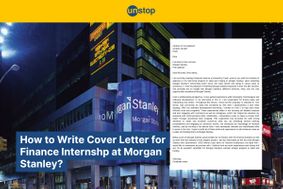
How To Write Finance Cover Letter For Morgan Stanley (+Free Sample!)
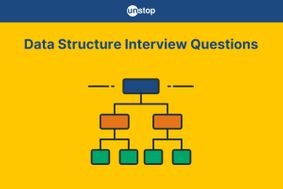
55+ Data Structure Interview Questions For 2026 (Detailed Answers)

How To Negotiate Salary With HR: Tips And Insider Advice

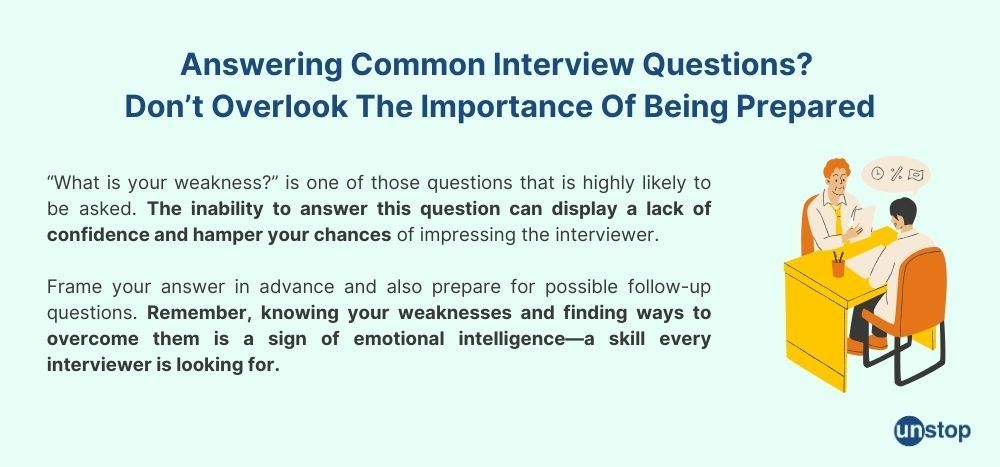










Comments
Add comment